Book contents
- Frontmatter
- 1 What is Romanticism, and where did it come from?
- 2 From early to late Romanticism
- 3 Prose fiction of the German Romantics
- 4 The Romantic lyric
- 5 The Romantic drama
- 6 Forms and objectives of Romantic criticism
- 7 Romanticism and Classicism
- 8 Women writers and Romanticism
- 9 The Romantics and other cultures
- 10 Love, death and Liebestod in German Romanticism
- 11 Romantic philosophy and religion
- 12 Romantic politics and society
- 13 Romantic science and psychology
- 14 German Romantic painters
- 15 Romanticism and music
- 16 Transformations of German Romanticism 1830-2000
- Key authors and their works
- Further reading
- Index
11 - Romantic philosophy and religion
Published online by Cambridge University Press: 28 September 2010
- Frontmatter
- 1 What is Romanticism, and where did it come from?
- 2 From early to late Romanticism
- 3 Prose fiction of the German Romantics
- 4 The Romantic lyric
- 5 The Romantic drama
- 6 Forms and objectives of Romantic criticism
- 7 Romanticism and Classicism
- 8 Women writers and Romanticism
- 9 The Romantics and other cultures
- 10 Love, death and Liebestod in German Romanticism
- 11 Romantic philosophy and religion
- 12 Romantic politics and society
- 13 Romantic science and psychology
- 14 German Romantic painters
- 15 Romanticism and music
- 16 Transformations of German Romanticism 1830-2000
- Key authors and their works
- Further reading
- Index
Summary
'Romanticism' has often been regarded as being impossible to define in a clear manner, and there is very little agreement on what characterises philosophers who, even just in a German context, can be specifically termed 'Romantic'. Some commentators restrict the term 'Romantic philosophy' to the 'early German', 'Jena' Romantics, Friedrich Schlegel and Friedrich von Hardenberg (Novalis) and, sometimes, F. D. E. Schleiermacher and K. W. F. Solger, whereas others include Immanuel Kant, G. W. F. Hegel, Arthur Schopenhauer, Friedrich Nietzsche and others. If we look at a characteristically provocative remark by a philosopher and writer who helped to bring the term Romantic into common usage, we can both elucidate the issue of definitions and get a sense of how one self-styled Romantic philosopher regards the task of philosophy. Friedrich Schlegel talks of the 'Ungeheurer Irrthum, daB von jedem Begriff nur Eine Definition möglich sei' ('Massive mistake, that only One definition is possible of every concept'), and he suggests that we should rather seek 'Unendlich viele ... reale synthetische' ('infinitely many ... real synthetic [definitions]'). In the Kritik der reinen Vernunft (1781, second, expanded edition 1787; Critique of Pure Reason) Kant is also overtly suspicious of the idea that concepts can be strictly defined. He claims that definition is really only possible for mathematical axioms, and that 'meine Erklärung kann besser eine Deklaration (meines Projekts) als Definition eines Gegenstandes heiBen' ('my explanation [of a concept] can better be termed a declaration (of my project) than a definition of an object').
- Type
- Chapter
- Information
- The Cambridge Companion to German Romanticism , pp. 175 - 190Publisher: Cambridge University PressPrint publication year: 2009
- 16
- Cited by

